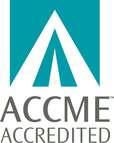Continuing Medical Education

Accreditation Statement
The American Association for Cancer Research (AACR) is accredited by the Accreditation Council for Continuing Medical Education (ACCME) to provide continuing medical education activities for physicians.
Credit Designation Statement
AACR has designated this live activity for a maximum of 17.0 AMA PRA Category 1 Credit(s)™. Physicians should only claim credit commensurate with the extent of their participation in the activity.
Credit certification for individual sessions may vary, dependent upon compliance with the ACCME Accreditation Criteria. The final number of credits may vary from the maximum number indicated above.
CLAIMING (CME) CREDIT
Physicians and other health care professionals seeking AMA PRA Category 1 Credit(s)TM for this live continuing medical education activity must complete the online CME Request for Credit Survey by July 26, 2024. Certificates will only be issued to those who complete the survey. Your CME certificate will be sent to you via email after the completion of the activity.

Successful completion of this CME activity, which includes participation in the evaluation component, enables the participant to earn up to 17.0 Medical Knowledge MOC points in the American Board of Internal Medicine’s (ABIM) Maintenance of Certification (MOC) program. Participants will earn MOC points equivalent to the amount of CME credits claimed for the activity. It is the CME activity provider’s responsibility to submit participant completion information to ACCME for the purpose of granting ABIM MOC credit.
To receive ABIM MOC, participants must request MOC in the CME Request for Credit Survey and complete all questions. Once these steps are completed, AACR will submit your completion information via the ACCME’s Program and Activity Reporting System for the purpose of granting MOC points.
Statement of Educational Need, Target Audience, and Learning Objectives
Development of targeted cancer drugs has focused primarily on the products of oncogenes that are mutated in cancer. However, this has resulted in a focus on a relatively small number of targets by the pharmaceutical industry. The realization that some genes, which may not necessarily be mutated, can show synthetic lethality with pathways that are activated in cancer provides a potential array of novel drug targets. Moreover, synthetic lethality provides an additional opportunity to develop powerful drug combinations that can be exploited to deliver more lasting responses in the clinic and to combat drug resistance.
The focus of this AACR Special Conference is to bring together basic, translational, and clinical scientists working on exploiting these co-dependencies in cancer. The concept of synthetic lethality is derived from classical genetics and has been widely explored in model organisms and mammalian cells. Approval of the use of PARP inhibitors for the treatment of ovarian cancer patients that harbor BRCA1 mutations provided proof-of-principle evidence that targeting such co-dependencies represents a viable therapeutic strategy. This conference will include presentations representing the full spectrum of research, including advances in the latest techniques for identifying and targeting synthetic lethal interactions, use of large datasets to uncover hidden connections and patterns, a comprehensive overview of therapeutic avenues, and analysis of synthetic lethality in the context of residual disease to tackle treatment-resistant cancer.
Synthetic lethal interactions in model organisms such as yeast, Drosophila, and zebrafish have progressed the field of classical genetics by elucidating functional relationships between genes. Large-scale mapping of genetic interactions in yeast have provided a comprehensive and functional network of gene relationships. The development of a comprehensive synthetic lethal interaction network in human tumor and normal cells would be a tremendous resource in the cancer research community; ongoing studies and emerging technologies are making this goal more feasible. Insights into cancer biology and vulnerabilities within the network to exploit would aid in the development of targeted therapeutics and combination therapies to kill tumor cells in a personalized medicine approach.
Given these developments in the field, there is a need for clinicians to be aware of these emerging developments and the therapeutic opportunities they represent.
After participating in this CME activity, physicians should be able to:
- Explain the mechanisms of synthetic lethality.
- Evaluate the utility of chemical biology tools to advance synthetic lethality.
- Assess emerging technologies to discover and evaluate new synthetic lethalities.
- Articulate how to exploit cancer cell vulnerabilities to overcome resistance and heterogeneity.
- Explain how to translate synthetic lethal biology to the clinic.
Disclosure Statement
It is the policy of the AACR that the information presented at AACR CME activities will be unbiased and based on scientific evidence. To help participants make judgments about the presence of bias, AACR will provide information that Scientific Program Committee members and speakers have disclosed all financial relationships they have with ineligible companies whose primary business is producing, marketing, selling, re-selling, or distributing healthcare products or services used by or on patients. All of the relevant financial relationships for these individuals have been mitigated.
Acknowledgment of Financial or Other Support
This activity is supported by Professional Educational Grants which will be disclosed at the activity
Questions about CME?
Please read our frequently asked questions. If you still have questions, contact the Office of CME at (215) 440-9300 or [email protected].
